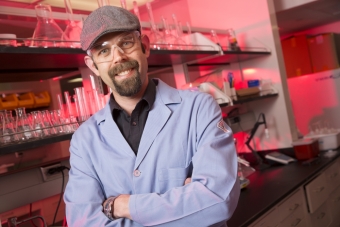
Date:
Location:
Title:
We are investigating new synthetic strategies for the fabrication and operation of adaptive, hybrid structures comprised of combinations of soft materials with functional (chemical, optical, mechanical, etc.) properties. Central to these efforts are elastomeric surfaces with heterogeneous chemical and physical properties that can be reversibly reconfigured using simple, macro-scale processes such as mechanical deformations. In this talk I will focus on our recent work in the assembly and micromanipulation of hydrogel prepolymer droplets using stretchable chemical templates.
Hydrogels are functional polymeric materials with stimuli-responsive properties applicable to a wide range of applications including soft electronics and robotics, three-dimensional cell culture, tissue engineering, and adaptive optics. Accordingly, the diversity and reported use cases of these materials has grown tremendously over the past decades, however, the microfabrication of multi-material, hydrogel-based devices remains a challenge. I will describe a simple microfabrication strategy that enables the facile production of fixed arrays of stimuli-responsive hydrogel microstructures with dynamic microactation functionality. Our approach uses rationally designed soft, stretchable chemical templates to (i) drive the surface assembly of prepolymer droplets into ordered arrays and (ii) provide surface chemical moieties to photograft materials (i.e., hydrogels) directly to the support. By executing these critical operations using a single template, we realized a seamless fabrication scheme applicable to the production of a diversity (in terms of materials and geometries) of functional microgel-based structures. To demonstrate the utility of our approach and the stability of fixed microgels in liquid phase applications, I will present prototypical microgel-based devices with stimuli-responsive (e.g., solvothermal and chemical) optofluidic and microactuation functionality. We envision many technologies, for example, liquid phase soft microactuators, stimuli-responsive 3D cell culture platforms, and micro/optofluidic chips, will directly benefit from the use of stretchable chemical templates in the fabrication of microgel-based, multi-material structures.
BIO
Stephen A. Morin is an Associate Professor, with tenure, in the Department of Chemistry at The University of Nebraska – Lincoln. His research interest include: materials chemistry, nano-/microscale assembly, nanomaterials synthesis and characterization, adaptive materials, soft robotics, hybrid materials systems, and bottom-up fabrication. Stephen completed his B.S in Chemistry at The University of Texas at Austin in 2004. He received his Ph.D. in Chemistry in 2011 from the University of Wisconsin - Madison. From 2011 until 2013, Stephen was a postdoctoral fellow in the lab of Professor George M. Whitesides in the Department of Chemistry and Chemical Biology at Harvard University. Stephen joined the faculty in the Department of Chemistry at UNL in Fall of 2013 and received tenure in Fall of 2019. He was awarded a 3M Non-tenured Faculty Award in 2015 and an NSF CAREER Award in 2016. He has published over 50 peer reviewed publications with over 4,000 citations.
Hosted by Chris Bates. Download Event Flyer.



